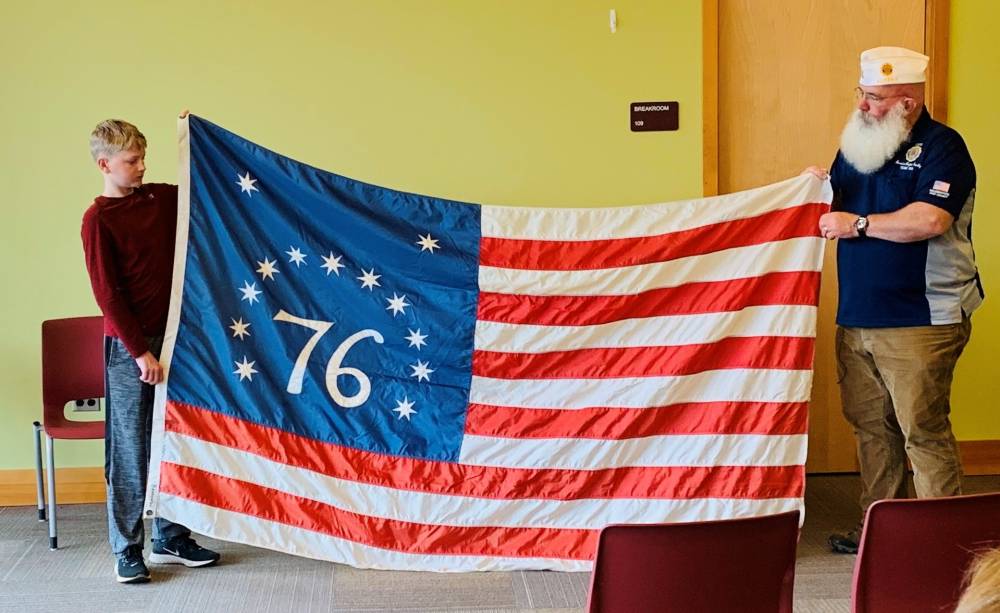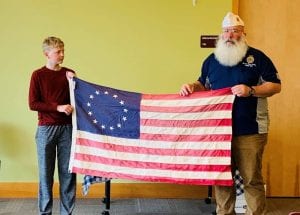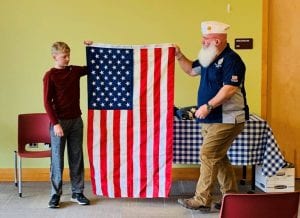
Do you know how to properly display the Stars and Stripes and are familiar with flag etiquette? With July 4th just around the corner, a special presentation on flags was given at the Ketchikan Public Library.
Hunter Davis is the chaplain and service officer for Ketchikan’s American Legion post. Davis and James Whaley, a Boy Scout and member of the Sons of the American Legion, provided information on the history of the American flag and how to display and care for it.
They began by showing a few flags given to the American Legion for proper disposal. Davis says if tattered and frayed, they are burned annually on Flag Day during a ceremony conducted by the local post. He says some are kept for display purposes or if in good condition.
One of the flags is the Betsy Ross flag, considered to be the first official flag.

“Besty Ross, according to legend, stripped pieces of fabric from an existing dress, and made this flag based on a suggestion by (George) Washington and the committee from the military. The 13 original stars in a circle, as in unbroken, the power of a circle is tough, and then the 13 stripes.”
The 13 stars and stripes represent the original colonies. The replica flag Davis and Whaley showed was manufactured in the late 20th Century.
The Bennington flag displays the number 76 for the year of independence. Davis says it was the first U.S. flag to use six-pointed stars instead of five.
“It’s also odd in that it’s white over white on the outside edge. American flags are now red over red.”
To display a flag properly, Davis says the United States flag should always stand on its own right.
“If you look at the front of a school building, if you look at the front of the Troopers’ headquarters as you go by, the flag is always on the left as you’re looking at it. If you’re out in the audience at a function, the flag is always on your left, but it’s the flag’s own right.”
When hanging a flag on a wall, either vertically or horizontally, the blue field and stars should be on the upper left.

Davis says it is fine to display old flags.
“We’ve got the Bennington Flag here, the Betsy Ross Flag, the 48 Star Flag. They were official U.S. flags, they can be flown at any time. So you do not need a 50-star flag.”
Davis says flags should be taken down at night unless there is enough ambient light or a light source is provided for it to be clearly identifiable as the U.S. flag.
“You’re honoring the flag that way. If it’s hidden in the darkness, that’s not the message you want to send. So that’s why, even at your house, if you’ve got a porch light that lights your display flag, that’s fine, because obviously from the street you can go, ‘Oh, U.S. flag,’ but you can’t use the side yard light and expect it to properly illuminate.”
Davis says damaged flags should be properly disposed of by burning. The American Legion accepts damaged or retired flags year-round. Davis says it’s okay to wash a flag or repair it if frayed. Contrary to what some have been taught, he says if a flag falls to the ground, it does not need to be destroyed, but should be lifted off the ground and cleaned if necessary.A free booklet, “Let’s Be Right on Flag Etiquette” and more information are available from American Legion Post #3 on Park Avenue.





